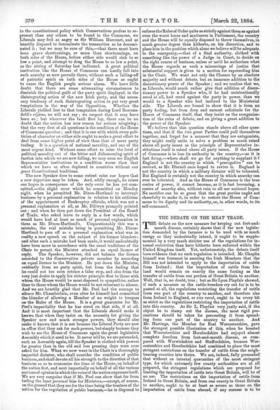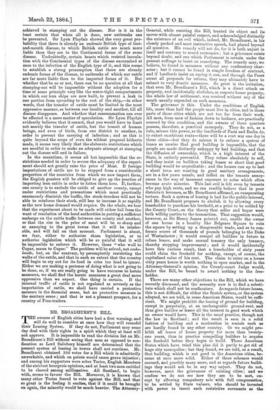THE DEBATE ON THE MEAT TRADE.
THE debate on the new measure for keeping out foot-and- mouth disease, certainly shows that if the new legisla- tion demanded by the farmers is to be used with as much energy as they undoubtedly intend, it ought to be supple- mented by a very much stricter use of the regulations for in- ternal restriction than have hitherto been enforced within the United Kingdom itself. Yet, unfortunately, the debate itself bore evidence that no such regulation is intended. Mr. Chaplin himself was foremost in assuring the Irish Members that the Bill was not intended to apply to the importation of cattle from Ireland ; that the importation of cattle from Ire- land would remain on exactly the same footing as the transfer of cattle from one portion of Great Britain to another. Well, that is, no doubt, true ; but as Sir Lyon Playfair showed, if such a measure as the cattle-breeders cry out for is to be passed at all, the regulations restricting the transfer of cattle from one part of the country to another, and therefore also from Ireland to England, or vice versd, ought to be every bit as strict as the regulations restricting the importation of cattle into this country. As Sir L. Playf air very justly said, if the object be to stamp out the disease, the most rigid pre- cautions should be taken for preventing it from spread- ing from one part of the country to another. And Mr. Hastings, the Member for East Worcestershire gave the strongest possible illustration of this, when he boasted that Worcestershire and Herefordshire had enjoyed almost complete freedom from foot-and-mouth disease, as com- pared with Warwickshire and Staffordshire, because Wor- cestershire and Herefordshire had combined to place the most stringent restrictions on the transfer of cattle from the neigh- bouring counties into theirs. We are, indeed, fully persuaded' that without an internal quarantine of the most stringent type, for which extremely few- county authorities are at all prepared, the stringent regulations which are proposed for limiting the importation of cattle into Great Britain, will be of no use. The restrictions on the importation of cattle from Ireland to Great Britain, and from one county in Great Britain to another, ought to be at least as severe as those on the importation of cattle from abroad, if any success is to be
achieved in stamping out the disease. Nor is it in the least certain that when all is done, new outbreaks can be prevented. Sir Lyon Playfair showed the very great pro- bability that there is already an endemic British type of foot- and-mouth disease, to which British cattle are much more liable than they are to the Continental forms of the same disease. Undoubtedly, certain beasts which resisted inocula- tion with the Continental types of the disease succumbed at once to the infection of the English type of it, and this seems to establish a strong presumption that there are already endemic forms of the disease, to outbreaks of which our cattle are far more liable than to the imported forms of it. But whether that be so or not, there can be no question at all that stamping-out will be impossible without the adoption for a time of some principle very like the water-tight compartments in which our iron ships are now built, to prevent a leak in one portion from spreading to the rest of the ship,—in other words, that the transfer of cattle must be limited in the most oppressive manner, as between one locality and another, till all disease disappears. And whether that consummation can ever be effected is a mere matter of speculation. Sir Lyon Playfair evidently believes that it cannot, that you would have to limit not merely the transfer of cattle, but the transit of human beings, and even of birds, from one district to another, in order to prevent the carrying of infection ; and as this is quite beyond the scope of even the wildest proposal hitherto made, it seems very likely that the elaborate restrictions which are needful in order to make an adequate attempt at stamping out the disease will end in failure.
In the meantime, it seems all but impossible that the re- strictions needed in order to secure the adequacy of the experi- ment should not greatly raise the price of Meat. If foreign importations of cattle are to be stopped from a considerable proportion of the countries from which we now import them, the English graziers will be obliged to give up the practice of importing lean cattle in order to fatten them here. If, further, one county is to exclude the cattle of another county, except under restrictions and precautions which must practically enormously diminish the traffic, the stock-breeders will not be able to reinforce their stock, still less to increase it as rapidly as the new home demand would require. On the whole, we fear that the experiment about to be made will either fail from the want of resolution of the local authorities in putting a sufficient embargo on the cattle traffic between one county and another, or that the rise in the price of meat will be so sharp and so annoying to the great towns that it will be intoler- able, and will fail on that account. Parliament is about, we fear, either to authorise sham legislation, or to authorise legislation which will- be so painful that it will be impossible to enforce it. However, those "who wull to Cupar, mann to Cupar." The problem will be solved, not ambu- lando, but, on the contrary, by peremptorily restricting the walks of the cattle, and that to such an extent that the country will begin to cry out for its food in cries too loud to ignore. Either we are making a pretence of doing what is not going to be done, or, if we are really going to have recourse to heroic measures, we shall find the heroic measures a great deal more oppressive than we expect. One thing is certain. If the internal traffic of cattle is not regulated as severely as the importation of cattle, we shall have carried a protective measure in the financial sense, but no protective measure in the sanitary sense ; and that is not a pleasant prospect, for a country of Free-traders.



































 Previous page
Previous page